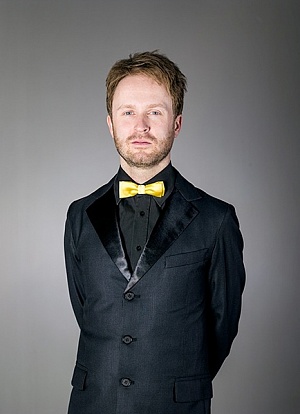
MARTINŮ VOICES: A BREATH OF FRESH AIR
GENERIC INTERVIEW


On the occasion of the release of Martinů Voices’s debut album, the ensemble’s chorus master Lukáš Vasilek answered a few questions.
The chamber choir Martinů Voices largely devote to 20th-century music. Testamentum (SU 4159–2) is the ensemble’s first independent album and, at the same time, their Supraphon debut. What inspired you to record a CD featuring Jan Novák’s music?
We wanted an original dramaturgy, bringing something new, novel, unexpected even. And we also wanted to dedicate our first independent disc to 20th-century Czech music. In this light, choosing Jan Novák was actually quite natural: he is an unjustly overlooked, although, paradoxically, highly respected composer; his music, the vocal pieces in particular, has clearly global parameters and, what’s more, the majority of his choral works fit Martinů Voices’s chamber configuration well. I really appreciate that Supraphon understood and embraced our intention. Precious few labels have the courage to embark upon such a bold project nowadays.
The album features two compositions that have been recorded in world premiere. What are the works like, and on what basis did you select them?
When I was putting together the programme, I knew for sure that I wanted to record the Exercitia mythologica and Testamentum, which I was familiar with from older recordings. But the major part of Novák’s choral oeuvre has not been recorded at all and is virtually unknown. Accordingly, so as to be able to draw up the disc’s dramaturgy, I had to go through all Novák’s choral pieces. I ultimately chose two rather extensive and contrasting compositions. The first of them, Invitatio pastorum, is a small Christmas cantata with flute accompaniment. Compared to all the other works, it is more lucid and, seemingly, simpler. I am delighted that the composer’s daughter, Clara Nováková, was able to undertake the impressive flute part. The other piece is the polar opposite. Fugae Vergilianae is one of the most demanding Czech choral compositions there is. It took me a long time to muster up the courage, but now I’m glad that we didn’t shy away from its sheer complexity. The recording of the Fugae is, in my opinion, a precious document of how far Novák got in his compositional artistry, and also of how far Martinů Voices have got.
Your name is mainly familiar to the music-loving public in connection with the Prague Philharmonic Choir, whose main chorus master you have been since 2007. In 2010 you established the chamber choir Martinů Voices. What was the main impulse for founding this vocal ensemble?
I had long been allured by the chamber choral repertoire and with the Prague Philharmonic Choir I have only got to it occasionally. It is indeed a breath of fresh air. You work with a totally different sound, you tackle even the tiniest details, arrive at the interpretation through different routes. The work is totally different and, in a nutshell, really refreshing. What’s more, four years ago I was surrounded by several splendid singers who were eager to try out vocal chamber music too. And so the idea has come to fruition
and the ensemble really exists and functions. Martinů Voices afford my work another dimension, which I need and enjoy.
What other projects have Martinů Voices planned for this year?
2014 is the fifth year of our existence and I think that this small anniversary has been quite successful. Supraphon has released our first independent album, at the end of May we made our first appearance at the Prague Spring festival, presenting a demanding programme made up of Bohuslav Martinů and Jan Novák works. In December we are scheduled to debut with the Czech Philharmonic – Jiří Bělohlávek has invited us to participate in a concert performance of Martinů’s chamber opera What Men Live By. In addition to these projects, we will naturally give other concerts throughout the Czech Republic, and in the autumn we will be making our very first appearance in Germany.